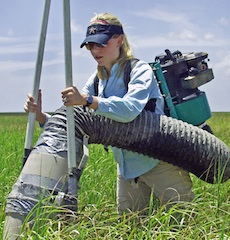Grad Student and Professor Assess How Oil Spills Affect Salt Marsh Arthropods

In one of the first studies to look at how oil spills affect salt marsh arthropods, Brittany McCall, a UH graduate student, and biology professor Steven Pennings, her adviser, sampled terrestrial arthropods and marine invertebrates at the time of the oil spill, as well as a year later.
The April 2010 explosion aboard the Deepwater Horizon resulted in a massive oil spill in the Gulf of Mexico that washed ashore, damaging a number of coastal areas.
McCall and Pennings received a grant from the National Science Foundation to study some of the coastal salt marshes affected by the spill. They gathered samples in areas where relatively low levels of oil were present but the plants still appeared healthy and undamaged. They found that in these areas, the numbers of crabs, insects and spiders were reduced by up to 50 percent because of the oil exposure.
“This study demonstrates that appearances can be deceiving,” Pennings said. “Arthropods are quite vulnerable to oil exposure. These results are very important because they show that we can't assume that the marsh is healthy just because the plants are still alive.”
However, the fact that some plant life remained intact in these areas apparently was key to how the arthropods recovered. When the UH researchers sampled the same areas a year later, all three groups appeared to have recovered, suggesting that arthropods affected by oil may recover if their host plants remain healthy.
“Salt marshes are commonly disturbed by natural events and, as a result, they may be able to also recover from oil spills if the oil disturbance is not too large,” Pennings said.
Oil spills pose a major threat to coastal wetlands, but the exact environmental costs are difficult to measure because experiments cannot replicate large environmental catastrophes.
Because each oil spill is different, McCall and Pennings cautioned against extrapolating their results to all oil spills.
“The effect of oil on the marsh is likely to vary depending on how much oil gets ashore and how much it has weathered,” McCall said. “In the case of the Deepwater Horizon oil spill, the marshes may have dodged a bullet because relatively little oil made it into the marshes, and the oil had weathered for several weeks.”
To read the entire study published in PLoS ONE, go to: http://bit.ly/ApBiZQ
- Laura Tolley, University Communication